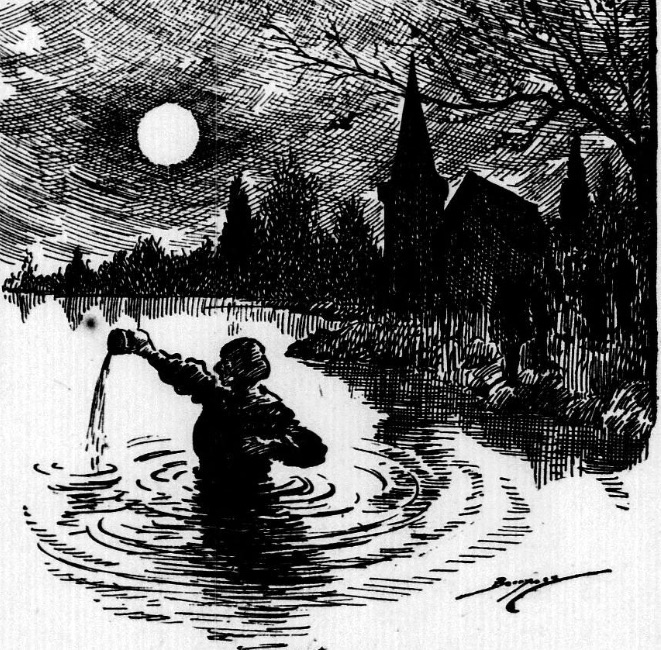
Were moon superstitions, as well as all superstitions, created out of mere coincidence? The author of this newspaper article seems to think so and he gives us some of the superstitions that were still being followed in the 1920s.

Moon Superstitions Rife, Even in this Advanced Age
American Farmers Plant Potatoes in the “Dark” of the Moon, While No Scotland Mother Will Wean a Baby When it is on the Wane
By Garrett P. Serviss
The total eclipse of the moon early in the evening of May 2 seems to have attracted an unusual amount of public attention, and was the occasion of the birth of a new legend, or at least what would surely have become a legend if the event had occurred some hundreds of years ago.
Even in the present day, I shall be surprised if, in consequence of what happened in Connecticut during the obscuration of the moon in the earth’s shadow, a permanent addition is not made to the extensive folklore about lunar influences.
Just when the moon became fully buries in the shadow a sudden hailstorm burst in Central Connecticut, and immediately the spectators drew the conclusion that the two coincident phenomena, the eclipse and the storm, were casually related.
The hailstones are said to have been of uncommon size, and the imagination required no aid in convincing some of the onlookers that a decided chill fell upon the earth as the moon’s light was withdrawn and that this chill was the cause of the hail.
Such a line of reasoning, loose as it was, is natural. To the average mind there is nothing so resistless as coincidence. Let two extraordinary (or even merely unusual) things occur in striking juxtaposition and nine persons out of ten will associate them as cause and effect, or as both the effects of a common cause.
I have no doubt that this coincidence of an eclipse with a hailstorm will become, though its details will be forgotten, a lasting tradition in the literature of natural marvels. Age will strengthen it in proportion as the passage of time lengthens its roots and obscures their origin.
Superstitions Not Exaggerated
That such an expectation is not exaggerated is proved by many historic example. What but pure coincidence of this kind was the origin of the ancient belief in auspices?
The appearance of birds in flight on this side or that, or going in one direction or another, interpreted as indications of the fate of a battle or a campaign, and thus governing the movements even of a Roman army, as well as the strategy of some of the greatest generals of antiquity – all that embodied in a great system of priestcraft (the institution of the augurs) can only have had its birth from some striking coincidence powerfully affecting a supersensitive imagination.
In some general, just before fighting a disastrous battle, happened to have his attention attracted by an extraordinary flight of crows crossing his path, or perhaps, more likely, if some superstitious soldiers in the ranks saw and talked about the incident, that would be all that was necessary in those days to set up a belief in an occult connection between the flight of ominous birds and the face of battles.
There absolutely was no other ground than a forgotten coincidence for the superstition which held back the warlike Spartans from marching to aid the Athenians at Marathon until the moon had “filled out her circle” – that is, had reached the full phase.
It had, some time or other, happened that a Spartan army, settling out just before full moon, was defeated, and some imaginative person thereupon started the legend that it was unlucky for Spartans to march forth to war at such a time in the month.
But that kind of unreasoning logic has not disappeared from the world. Have you ever been tempted to try whether there might not be some virtue in the tradition that your hair will grow better if you have it cut before full moon, during the two weeks that she is “increasing,” i.e. between the “new” and the “full” phases? I have known persons who had full faith in that superstition, and they were people moving in “educated” circles, too.
Other Curious Superstitions
Many farmers plant certain seeds only during the “increase” of the moon. They think that the moon being on the up grade, so to speak, brings up the sprouts. This is really much worse than the case of the Yankees and the hail-bringing eclipse, for in the latter there was at least colorable argument of casual connection on account of the possible effect of the withdrawal of the moon’s radiation.
Among other deathless moon superstitions, evidently based on coincidences, are such as these: Wild weather is near when “a big star is seen dogging the moon.” Concerning this particular superstition we have the story of an old fisherman of Torquay, who, after a great tempest, said: “I knowed ’twas coming, safe enough. I see a big star ahead of the moon towing her and another astern chasing her.”
In Scotland it is an old tradition that children should never be weaned during a waning moon. Even so old a writer as Plutarch records the belief that timber felled in the full of the moon is soft and relatively useless.
An English tradition affirms that if Christmas comes with a waxing moon the year will be fat, but if with a waning moon, lean. The part played by coincidence in every one of these and in a hundred other similar notions stands conspicuous.
Source: Richmond times-dispatch. (Richmond, Va.), 30 May 1920.

